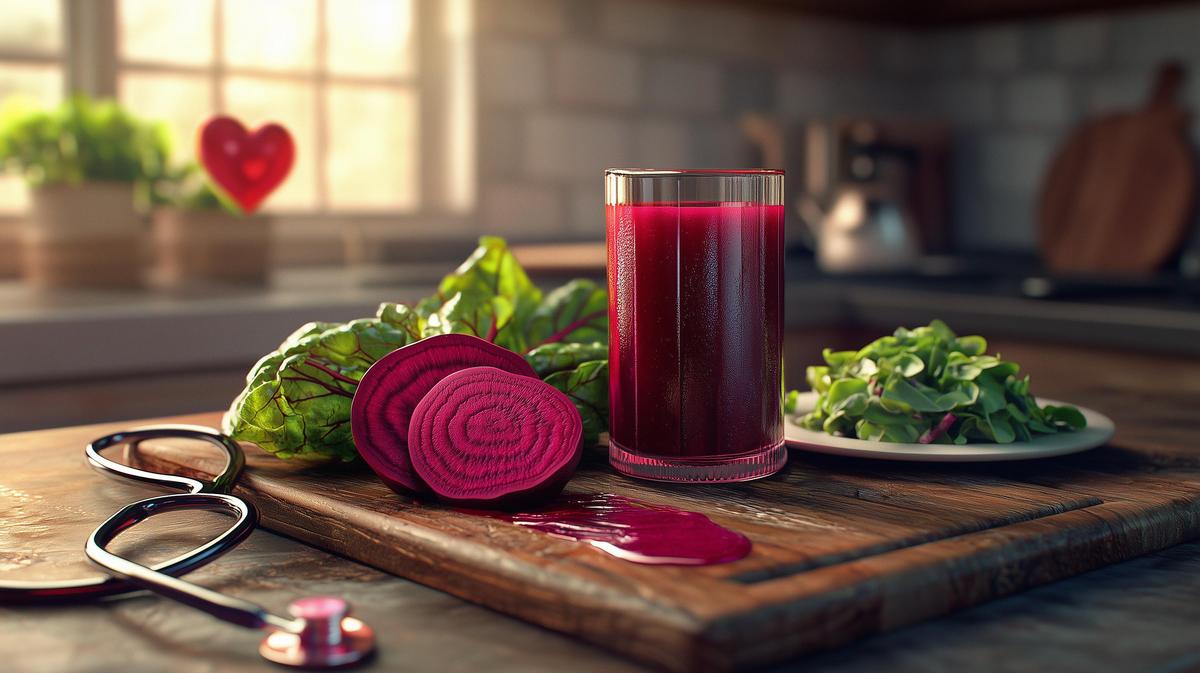TL;DR:
- Heart Health: Beets are rich in dietary nitrates, which convert to nitric oxide in the body, relaxing blood vessels, improving blood flow, lowering blood pressure, and supporting cardiovascular health.
- Nutrients: High in folate (cell repair), potassium (heart function), and antioxidants like betanin, which reduces inflammation and free radicals.
- Gut Health: Packed with fiber to improve digestion.
- Athletics: Boosts oxygen delivery to muscles and endurance, reduces exercise fatigue, and aids recovery.
- Consumption: 200-250ml beet juice or 300-500g raw beets daily for benefits. Efficient alternatives include beet powders, bars, or chips.
- Side Effects: May cause beeturia (red urine), stomach discomfort, or kidney stone risks if overconsumed.
- Convenience: Innovative products like beet-cereal bars retain nitrate content and provide easy access to heart health benefits.
When it comes to heart health, could beets be the secret weapon you’re overlooking? Packed with nutrients and natural compounds that support blood flow and heart function, beets are gaining serious attention in the wellness world. From improving circulation to aiding in blood pressure management, the link between beets and cardiovascular health is undeniable. Let’s explore why this vibrant root vegetable might just be your heart’s new best friend!
What Are the Key Health Benefits of Beets?
Beets are small but powerful when it comes to supporting your health. One of their most outstanding features is their rich dietary nitrate content. Nitrates in beets are converted into nitric oxide in the body, which helps relax blood vessels and improves blood flow. This can lead to lower blood pressure and better heart health. For those worried about cardiovascular issues, beets are like a natural boost for your arteries.
Beets are also a powerhouse of nutrients. They are packed with vitamins like C, folate, and essential minerals like potassium and manganese. Folate supports cell repair, while potassium helps in maintaining healthy heart function. These nutrients work together to promote overall health and energy.
Another strong benefit of beets is their antioxidant properties. They contain compounds like betanin, which gives them their vibrant color and fights harmful free radicals in the body. Free radicals can damage cells and lead to chronic diseases, including heart disease. Antioxidants from beets help protect your cells and might even lower your risk of serious illnesses.
Beets also contain saponins and polyphenols, both of which provide additional health advantages. Saponins might have a role in balancing cholesterol levels, and polyphenols can reduce inflammation in the body. Reduced inflammation is especially important for heart health since it lowers stress on blood vessels.
If you’re looking for another reason to include beets in your meals, they are fiber-rich. This fiber is good for your gut and supports digestive health. By adding beets, you’re not only boosting your heart health but also improving overall wellness. For more details on beet benefits, this study dives deep.
How Do Beets Improve Cardiovascular Health?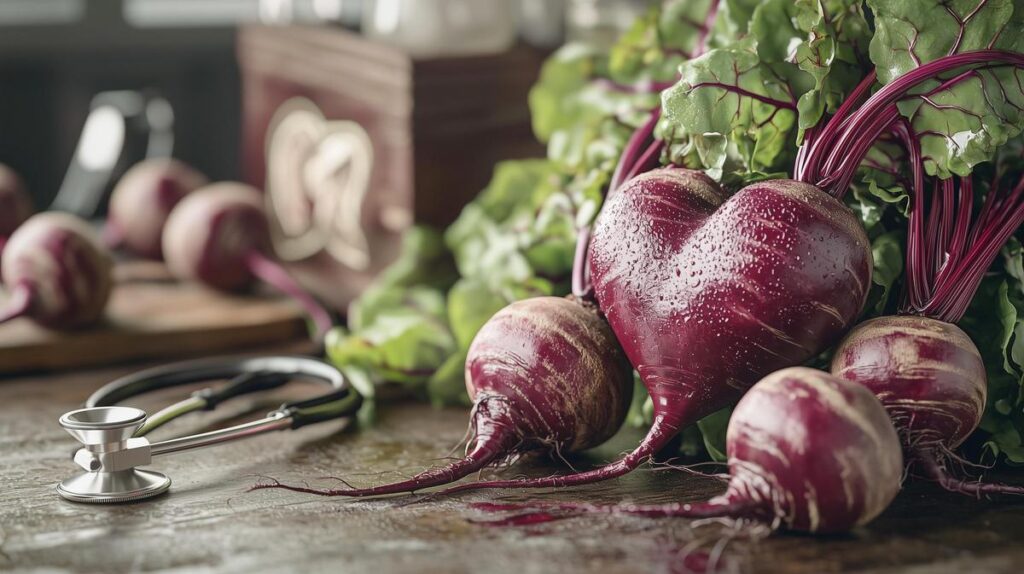
Beets play a big role in keeping your heart healthy. The secret lies in nitrates. Nitrates in beets help make nitric oxide, a molecule your body needs. So, what does nitric oxide do? It relaxes blood vessels, improves blood flow, and lowers blood pressure. Think of it as a natural way to ease the workload on your heart.
You might ask, “How does this help my heart over time?” The answer is simple: better blood flow means less strain on the heart. Healthy blood vessels are key to reducing the risk of heart disease. Beets also bring other nutrients to the table like betanin, saponins, and polyphenols. These team up with nitrates to fight harmful agents in the body and support overall heart health.
“How does beet consumption compare to other natural heart remedies?” Beets stand out. Why? Unlike many foods, they directly boost nitric oxide levels, which many heart-friendly options do not. For instance, beetroot for heart health is more focused on improving blood flow than foods high in omega-3, which target cholesterol. Both are crucial, but the approach differs.
But here’s the catch: eating enough fresh beetroot can be hard. Drinking beet juice works, but it has lower nitrate content. That’s why new beet products, like beet-cereal bars or beet gel, make it easier to get the benefits. These are packed with nitrates, so you can strengthen your heart without eating a mountain of beets.
If you’re looking for a proven way to keep your heart strong, start with beets. The science is clear, and their versatility makes them easy to include in your diet. For more scientific details, check out this research on beets and cardiovascular health.
Why Are Nitrates in Beets Essential for Healthy Blood Flow?
Dietary nitrates in beets are natural compounds that boost blood flow. When you eat beets, these nitrates turn into nitric oxide in your body. Nitric oxide helps relax blood vessels and improves circulation. This process lowers blood pressure and makes it easier for your heart to pump blood.
Beets are considered nitric oxide boosting vegetables because of their high nitrate levels. Nitric oxide plays a key role in keeping blood vessels healthy. It reduces arterial stiffness and helps the smooth muscles in your arteries relax. By doing so, it cuts the strain on your heart and lowers your chances of heart problems.
You might wonder, what are the science-backed effects of dietary nitrates? Studies show that nitrates from beets improve endothelial function. The endothelium is the thin layer of cells lining your blood vessels. Healthy endothelium helps your blood flow smoothly. Nitrates also reduce the harmful effects of reactive oxygen species, which can damage your blood vessel walls. Additionally, they enhance oxygen delivery to tissues, aiding both your heart and muscles.
But why are nitrates in beets specifically important for heart performance? Along with nitrates, beets are rich in phytochemicals like betanin and polyphenols. These compounds work with nitrates to enhance the production of nitric oxide. This combination not only protects your heart but also supports overall cardiovascular health.
While fresh beets or beet juice offer great benefits, some people struggle with consuming large amounts. Innovative products like beetroot chips or cereal bars provide convenient alternatives, delivering the same nitrate power without the hassle. If you’re looking to maintain healthy blood flow, eating any nitrate-packed beet product can be a great choice. Learn more about how nitrates work in your body.
Is Beetroot Juice Effective for Lowering Blood Pressure?
Yes, beetroot juice can help lower blood pressure naturally. The key lies in dietary nitrates found in beets, which your body converts into nitric oxide. Nitric oxide relaxes blood vessel walls, allowing blood to flow more easily. This reduces both systolic and diastolic pressure, as shown in studies like this one. Drinking beetroot juice can be a simple and effective way to manage hypertension.
But how effective is daily beet juice for hypertensive patients? Research shows that regular consumption leads to measurable benefits. A single serving of 200 milliliters (around 6.8 ounces) of beet juice can lower blood pressure by 4-10 mmHg within hours. For long-term effects, daily intake helps maintain healthy levels, especially for those with high blood pressure. The impact is often compared to certain medications but without the side effects.
Beet juice isn’t the same as medication, though. It works best as part of a balanced lifestyle that includes healthy eating and exercise. It’s a great option for those looking for natural alternatives, but it’s not a standalone solution for severe cases.
Beets also pack phytochemicals like betanin and saponins, which fight oxidative stress and support heart health. However, some people face challenges. Drinking large amounts of beet juice can cause stomach discomfort or beeturia, a harmless condition where your urine turns red. For those who find traditional juice hard to consume, beet products like beet chips or beet-cereal bars offer a more convenient and modern approach.
Incorporating nitrate-rich beets into your diet, whether as juice or other products, supports natural blood pressure management and promotes cardiovascular health effectively.
How Do the Antioxidants in Beets Protect the Heart?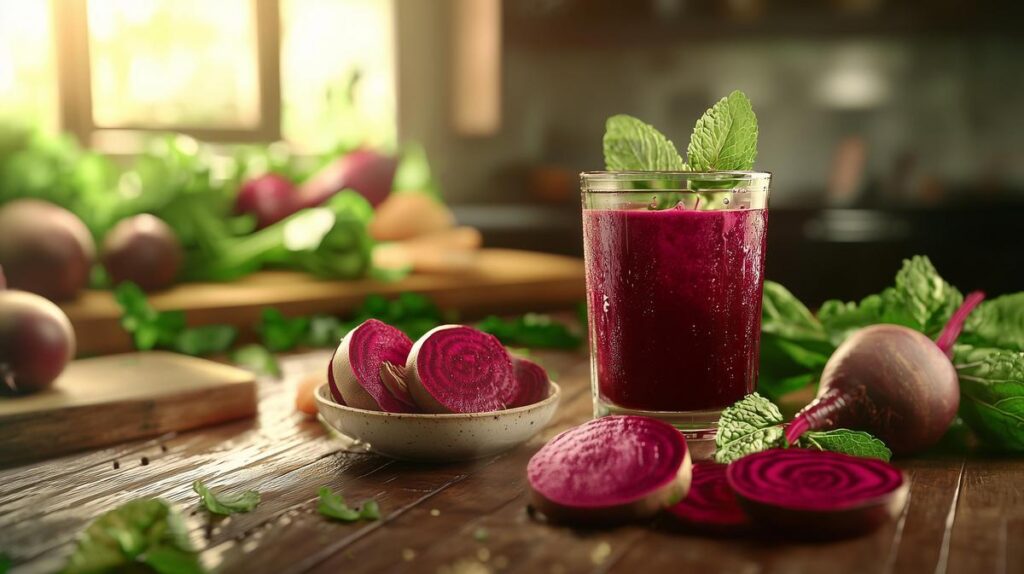
Antioxidants in beets, especially betanin, shield the heart by fighting oxidative stress. Oxidative stress happens when harmful molecules, called free radicals, damage cells in your body, including those in your heart and blood vessels. Antioxidants from beets neutralize these free radicals, reducing the risk of heart-related diseases.
Betanin, the pigment that gives beets their deep red color, plays a key role here. It not only tackles free radicals directly but also helps lower inflammation. Both of these processes are crucial because high inflammation and oxidative stress contribute heavily to arterial damage and heart disease risks. Clinical studies have shown that betanin decreases markers of inflammation and fights against lipid oxidation, which can harden arteries.
Beets also contain polyphenols and organic acids, which are other powerful antioxidant compounds. These help improve blood vessel function by supporting nitric oxide availability. Nitric oxide relaxes blood vessels, improving circulation and lowering blood pressure. Over time, better blood vessel health means less strain on the heart.
Eating beets also provides saponins, natural compounds that back up antioxidants in protecting your heart. Saponins may reduce cholesterol and improve how fats are processed in the body. This has a positive impact on keeping arteries clear and functional, lowering overall heart disease risk.
Studies confirm that combining beet antioxidants with dietary nitrates enhances their protective effects. This combination limits harmful reactive oxygen species, which can damage the heart at a cellular level. If you want more details about beet compounds and their anti-inflammatory actions, check out this scientific review. Including beets in your diet, whether raw, cooked, or as juice, can be a simple way to make your heart healthier.
Can Beets Improve Circulation and Blood Flow?
Beets improve circulation because they are rich in dietary nitrates. When you eat beets, these nitrates turn into nitric oxide in your body. Nitric oxide relaxes and widens blood vessels, which helps blood flow more easily. Studies, including findings by researchers published here, show that this process improves vascular health by reducing blood pressure and enhancing blood flow.
You might wonder how quickly beets improve circulation after eating them. The effects are surprisingly fast. Most research shows results within two to three hours after consuming beet-based foods or drinks. For instance, athletes often use beet juice right before competitions to boost endurance and blood flow. This quick response is one reason beets are gaining popularity as a natural way to boost circulation.
Beets also contribute to long-term heart health. Regular consumption strengthens blood vessels, making them more elastic and less stiff. The compound betanin in beets works together with nitrates to reduce harmful reactive oxygen species. This dual action not only improves blood flow but also reduces inflammation inside blood vessels.
But here’s the catch: large quantities can be difficult to eat or drink daily. Options like beet-cereal bars or beet chips are easier to consume while delivering enough nitrates. These innovative products allow people to improve blood vessel health without discomfort. For example, 45 grams of a nitrate-rich beet-cereal bar provides an effective amount of nitrate for cardiovascular benefits.
If you’re looking for natural ways to enhance circulation, start by adding beets to your diet. Whether raw, roasted, or in convenient forms like juice or bars, they give your body the nutrients it needs to keep your blood flowing strong.
What Is the Connection Between Beets and Athletic Heart Function?
How can beets help an athlete’s heart perform better during exercise? The answer lies in the nitrates found naturally in beets. Nitrates in the body convert into nitric oxide, which helps blood vessels relax and widen. This allows better blood flow and lowers the strain on the heart. As a result, athletes may experience improved endurance and healthier cardiovascular function.
For athletes, how do beets increase endurance during workouts? The improvement comes from enhanced oxygen delivery to working muscles. When muscles get more oxygen efficiently, the body uses energy more effectively. Studies show that consuming beet products, like juice or gels, reduces the oxygen cost of exercise. This means athletes can push harder or perform longer without feeling as fatigued.
Can beet products assist in workout recovery? They can. Some bioactive compounds in beets, like betanin and polyphenols, lower inflammation and oxidative stress in muscle cells. This makes recovery faster and less painful. Additionally, products like beetroot cereal bars or chips are convenient options for incorporating nitrates into daily routines.
Beets also help regulate blood pressure during intense activity. Athletes often experience surges in blood pressure while training, which can stress the heart if unchecked. The nitric oxide from beets helps smooth blood pressure spikes, offering ongoing support for the heart.
However, consuming enough fresh beets to achieve these effects can be challenging. That’s where concentrated forms like Can’t Beet This! or juice come in handy. Just 100 grams of beet gel can provide enough nitrates to boost performance. Athletes benefit from these forms because they are easier to use without sacrificing nitrate content or effectiveness.
Are Beets Effective in Preventing Heart Disease?
Yes, regular beet consumption may lower the risk of heart disease. Beets are rich in dietary nitrate, which your body converts into nitric oxide. This process helps relax blood vessels, improve circulation, and reduce blood pressure—key factors in heart disease prevention. Research shows that better blood flow can decrease strain on your heart, lowering overall risk.
But why do beets work this way? They contain betanin, polyphenols, and saponins—powerful plant compounds that fight oxidative stress and inflammation. These compounds prevent artery damage and improve heart health over time. Alongside nitrates, they support smoother blood flow and healthier arteries, both of which are essential in reducing the risk of heart disease.
Some populations benefit more from eating beets. People with high blood pressure or early-stage heart disease often see significant improvements. Athletes also gain advantages, as beets enhance endurance and cardiovascular efficiency. Older adults, who face greater risks of heart-related issues, may find beets helpful in improving arterial function and reducing stiffness.
Eating fresh beets or drinking their juice delivers these benefits, but not without challenges. To achieve therapeutic nitrate levels, you’d need large portions, which can cause stomach upset. Luckily, innovative beet products solve this issue. Items like beetroot-cereal bars and beetroot chips provide concentrated nitrates in smaller servings. These options make daily use easier while maintaining the same protective effects.
The link between beets and heart health is backed by studies. For example, a detailed review highlights their benefits for blood pressure and arterial function. Continual beet intake, especially in convenient forms, may support long-term heart wellness by lowering major risk factors for heart disease.
How Do Beets Affect Arterial Function?
Beets can keep arteries elastic, mainly due to their nitrate content. Nitrates in beets turn into nitric oxide in the body. This compound helps blood vessels relax and improves blood flow. When arteries are flexible, they are better at handling the flow of blood, reducing stress on the heart.
Eating more beets for arterial function could also lower stiffness over time. A study highlights how nitrates lower stiffness by improving endothelial function. The endothelium is a layer inside blood vessels. Healthy endothelial cells allow better blood flow and less blockage.
Another benefit of beets for vascular elasticity comes from their antioxidants. Beets contain phytochemicals like betanin and polyphenols. These reduce oxidative stress, a key factor in artery damage. By lowering stress, beets help the arteries stay strong and elastic.
Beetroot can also improve smooth muscle relaxation. Smooth muscles in arteries regulate blood pressure and flow. Nitric oxide from beets makes these muscles relax, helping blood pressure stay low. This effect supports the heart by reducing its workload.
Some innovations make it easier to get these benefits. Options like beetroot-cereal bars and concentrated beet juice offer high nitrate levels without eating large amounts of raw beets. They’re especially useful for people with busy schedules.
For long-term benefits, consistency matters. Regular consumption helps maintain the nitrate levels needed for these effects. However, large portions could cause digestive issues, so balance is key. Moderation ensures you get benefits without discomfort.
Beets are a natural, potent way to support arterial health. Their effects on elasticity and stiffness make them valuable for heart wellness strategies.
What Does Scientific Evidence Say About Beets’ Health Effects?
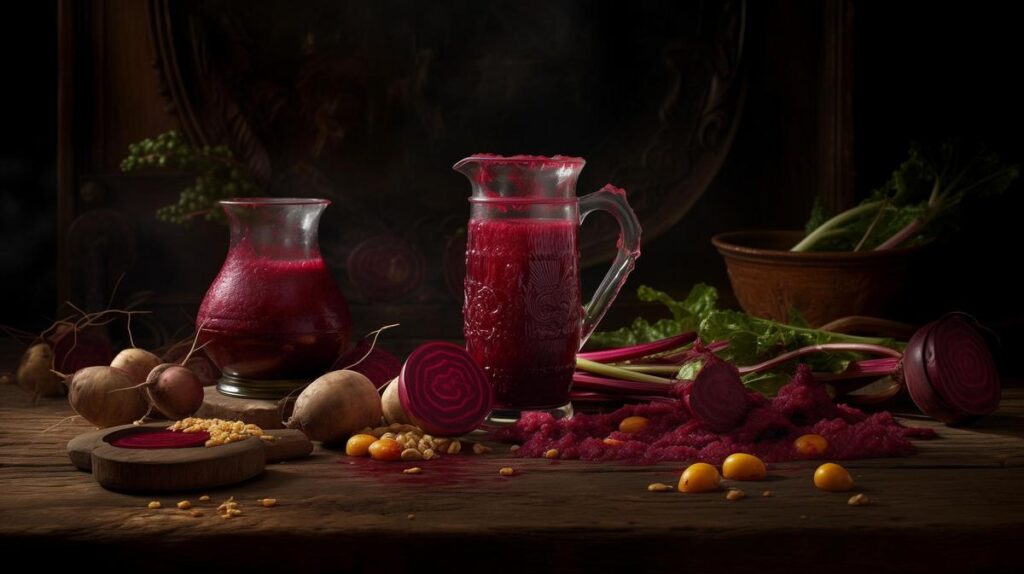 Scientific research shows beets are powerful for heart health. A major reason is their nitrate content. Nitrates help the body make nitric oxide, which relaxes blood vessels and lowers blood pressure. Clinical studies on beets and blood pressure confirm these effects. In one trial, participants who drank beetroot juice daily saw drops in systolic and diastolic blood pressure. These drops were significant compared to a placebo group.
Scientific research shows beets are powerful for heart health. A major reason is their nitrate content. Nitrates help the body make nitric oxide, which relaxes blood vessels and lowers blood pressure. Clinical studies on beets and blood pressure confirm these effects. In one trial, participants who drank beetroot juice daily saw drops in systolic and diastolic blood pressure. These drops were significant compared to a placebo group.
So, how does nitric oxide from beets compare to supplements? Beets often work better. Supplements can offer nitric oxide, but they lack the other compounds found in beets. For example, beets contain antioxidants and polyphenols that also support heart health by reducing inflammation and oxidative stress. This makes fresh beets or beet-formulated products more beneficial for long-term cardiovascular support.
The science behind beet-induced vasodilation is fascinating. Vasodilation refers to blood vessels widening for better flow. When you eat or drink nitrate-rich beets, the body converts nitrates into nitric oxide. This process improves circulation and relaxes arterial walls. This can reduce arterial stiffness, a big factor in heart disease.
Multiple studies have also explored how consuming nitric oxide foods for heart health, like beets, improves endothelial function. The endothelium is a thin layer inside blood vessels. It governs clotting, blood pressure, and vessel elasticity. When it works well, the risk of heart problems goes down.
Interestingly, innovative beet products like beet bars, juices, and gels now make it easier to consume the right amount of beneficial nitrates daily. These options maintain effectiveness while avoiding the large portions of raw beetroot that can cause gastric distress.
In short, clinical trials and lab findings affirm that beets—with their unique mix of nitrates and bioactive compounds—are a valuable tool for a healthier heart. You can explore some of these scientific findings to learn more.
How Do Innovative Beet Products Compare?
Beet powders can be as effective as fresh juice, depending on how they’re made. The key lies in preserving nitrates, which support heart health. Fresh beet juice delivers quick nitrate absorption, but powders offer convenience and stability. With powders, you can get consistent doses without dealing with spoilage or preparation. Plus, they are easier to include in diets for busy lifestyles. When comparing powders to raw beets, raw beets require large servings to match the concentrated nitrate levels in powders, posing more effort for the same benefit.
Fermented beetroot juice can offer enhanced cardiovascular benefits compared to non-fermented options. Fermentation boosts betalain content, which helps reduce oxidative stress—a factor in heart disease. The probiotics in fermented juice can also support gut health, which is linked to better overall cardiovascular function. One study found that regular intake of fermented beetroot juice may improve blood pressure by promoting better nitric oxide production. This process relaxes blood vessels, improving circulation and reducing strain on the heart.
Organic beet products for heart support, like beetroot-cereal bars, deliver more fiber and protein than juice products. For example, bars can provide over 16 grams of protein per 100 grams, which surpasses both chips and juice. They also include saponins, compounds shown to potentially lower cholesterol and improve gut microbiota. Such versatile formulations cater to different dietary needs, from athletes needing quick energy to individuals looking for heart-supportive snacks.
Choosing the right beet product depends on your goals. For daily convenience, powders or cereal bars work well. For a gut-health boost with heart benefits, fermented juices stand out. For more insights into beet products and their effects, explore this research.
What Are the Best Ways to Consume Beets for Heart Wellness?
Eating beets in any form offers heart benefits, but some methods stand out. When asked whether raw or cooked beets are better for maintaining nutrients, raw beets win here. Cooking, especially boiling, reduces nitrate levels—the nutrient linked to lowering blood pressure. However, steaming or roasting retains more of that nitrate while enhancing flavor. A great example is a roasted beet and citrus salad, a tasty and heart-healthy dish.
Smoothies are another fantastic way to use beets for heart wellness. Yes, blending enhances nutrient absorption. By breaking the beetroot’s structure, blending makes nutrients like nitrates and antioxidants more available to your body. Add carrots, spinach, or a squeeze of citrus to your beet smoothie for an even stronger nutrient punch and better taste.
Drinking beetroot juice daily has direct benefits for heart health. Beet juice is a concentrated source of dietary nitrates, which boost nitric oxide levels in your blood. This helps widen your blood vessels, lowering blood pressure and improving circulation. Studies show drinking just one cup daily can produce noticeable health improvements, especially in people with hypertension.
Portion size also matters. Eating fresh or juiced beets regularly, about five ounces cooked or 200 milliliters of juice, provides enough nitrates to support heart health without causing digestive discomfort or side effects like beeturia. If you’re looking for convenience, beet powders, chips, or even beet-cereal bars can also work. These products retain nutrients and offer creative alternatives to fresh beets.
Beets are versatile, so find what works best for your routine. Whether raw in salads, blended in smoothies, or sipped as juice, consistency is key. Keep experimenting to fit them into your daily habits while enjoying their heart-protective power.
How Much Beetroot Should You Eat for Cardiovascular Support?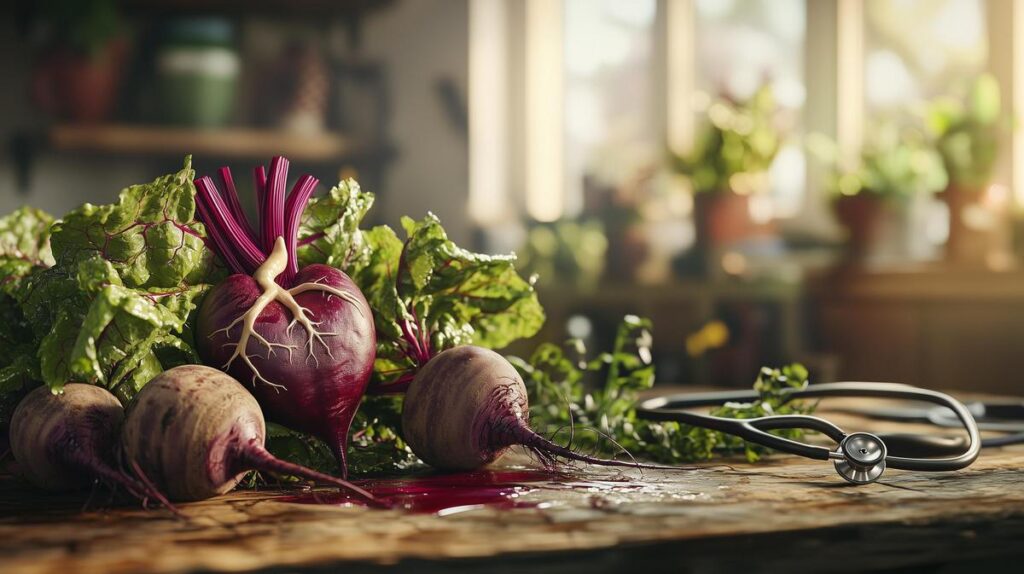
The ideal amount of beetroot for heart health depends on how it is consumed. Studies suggest drinking 200-250 milliliters of beetroot juice daily for its blood pressure benefits. This amount contains enough dietary nitrate to enhance nitric oxide levels, which improves blood flow and lowers blood pressure. For beet supplements, doses of 400-500 milligrams of nitrate per day have been effective. This concentration helps reduce arterial stiffness and supports overall heart health.
Eating fresh or cooked beets offers the same nitrate benefits, but requires larger portions. You may need 300-500 grams of raw beetroot daily to match the nitrate levels in juice or supplements. This may feel like a lot for most people, but other forms like beet powders or snacks can make it easier to reach therapeutic amounts. Beet-infused products, such as cereal bars or chips, also provide significant nitrate while adding taste and convenience. Learn more about nitrate-rich foods here.
Overconsuming beet products can lead to some issues. Beeturia, which causes red or pink urine, is common but harmless. Some people may experience mild stomach discomfort due to the high fiber and nitrate content. Large quantities might increase oxalate levels, contributing to kidney stone risk in sensitive individuals. To avoid these problems, stay within the suggested servings, usually around one glass of juice or one serving of concentrated product per day.
If you’re new to beets, start with smaller amounts and increase gradually. Always consult a healthcare provider, especially if you have high nitrate sensitivity or are on medications for blood pressure. Finding the right balance ensures you enjoy the heart-boosting benefits without complications.
Can Beets Help Control Cholesterol Levels?
Beets might not be the first food you consider for managing cholesterol. But studies suggest they play a role in keeping your heart healthier. The key lies in their nutrients, such as betanin, saponins, and polyphenols. These compounds appear to interact with pathways in your body that control LDL cholesterol, which is sometimes called the “bad” cholesterol. So, can beets really help lower LDL cholesterol? Yes, evidence hints that they can, although they work best when part of a heart-healthy lifestyle.
Let’s talk about how. Betanin, the pigment that gives beets their vibrant red color, acts as an antioxidant. Antioxidants help tackle free radicals—unstable molecules in your body that contribute to inflammation and damage. Inflammation is one of the culprits behind high LDL cholesterol. By neutralizing free radicals, beets indirectly support healthier cholesterol levels. Another nutrient in beets, saponins, can stick to cholesterol molecules in your gut and prevent their absorption into your bloodstream.
But what about research? A few studies, though not large, have shown that beet extracts reduced LDL cholesterol levels in participants over time. These studies also noted improvements in overall lipid profiles, especially when participants combined beet intake with exercise and healthy eating. While the research isn’t definitive yet, such findings offer promise for people looking for natural cholesterol management tools.
You may prefer to consume beets as juice, roasted vegetables, or even as part of innovative products like beetroot cereal bars. However, if you’re seeking a potent dose for cholesterol management, consider using beet supplements or extracts. While they concentrate key nutrients, they should not replace whole food or your doctor’s advice. Beets are just one piece of the puzzle—but a colorful and nutritious one worth adding to your diet!
What Are the Side Effects of Beet Consumption?
Beets can be a gift for your heart, but they’re not perfect for everyone. One common side effect is beeturia, which turns urine or stools red or pink. This happens to about 10-15% of people after eating beets, and it’s harmless. The red color comes from betanin, a pigment in beets, passing through your system. If you’re not expecting it, though, it can be quite alarming at first.
Another issue that some people face is an upset stomach or bloating after eating raw or juiced beets. Beets are high in fiber and natural sugars, which can cause discomfort for those with sensitive stomachs. Cooking beets can help make them easier to digest if this is a concern. Drinking beet juice quickly instead of sipping it slowly might also bring these digestive troubles.
Excessive beet consumption can contribute to kidney stone formation in people prone to oxalate buildup. Beets contain oxalates, which can bind with calcium and form crystals. If you have a history of kidney stones, it’s best to talk to your doctor before adding large amounts of beets to your diet.
Finally, be aware of the sodium content in some processed beet products like chips or pickled beets. They may not pack the same heart-friendly punch as fresh or juiced forms. Over time, high sodium intake can counteract beetroot’s benefits by raising blood pressure.
If you’re intrigued by beets and their effects, it’s important to consume them wisely. Moderation is key, as research suggests. By keeping portion sizes reasonable, you can enjoy the cardiovascular perks of beets without the drawbacks. Always consider your unique needs, and listen to your body’s signals.
What Makes Beets a Heart-Smart Superfood?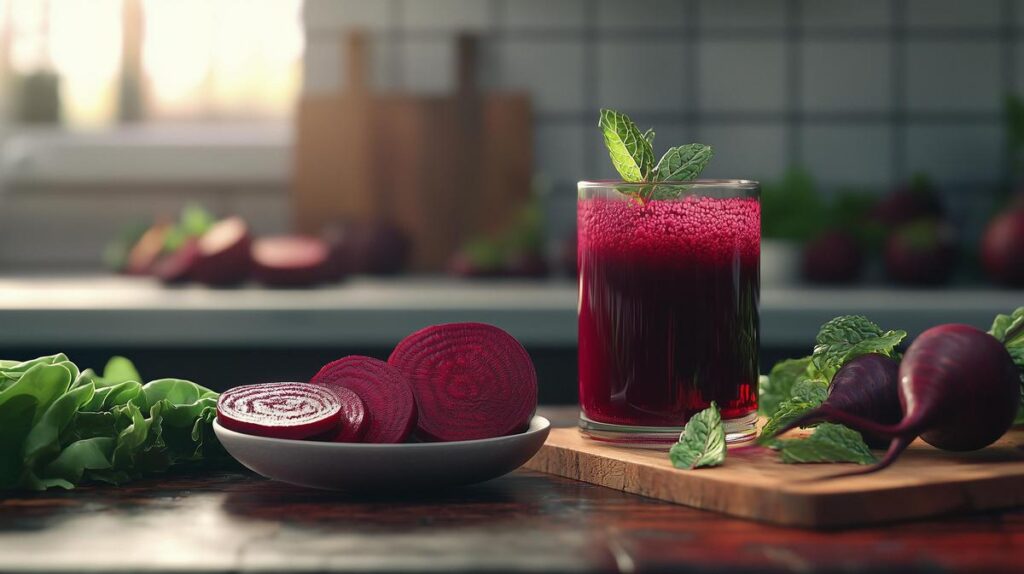
Beets earn their title as a heart-healthy superfood thanks to their unique nutrients. The standout ingredient in beets is dietary nitrate. Once consumed, nitrates turn into nitric oxide in your body. Nitric oxide helps relax blood vessels, which improves blood flow and lowers blood pressure. This makes beets a great choice for anyone looking to support their heart naturally.
Beyond nitrates, beets are packed with potassium, one of the body’s most important minerals. Potassium helps balance sodium levels, which supports healthy blood pressure. Compared to other heart-friendly vegetables like spinach or broccoli, beets excel in both their nitrate and potassium contents. This double benefit puts them ahead in heart care.
Beets are also loaded with other bioactive compounds. Betanin, the pigment giving beets their red color, reduces inflammation and protects cells from damage. Beets have polyphenols, saponins, and organic acids, which work together to fight oxidative stress. This combination helps prevent heart-related problems from developing over time.
Compared to other heart-healthy superfood vegetables, beets’ impact extends beyond basic nutrition. Vegetables like kale or sweet potatoes support the heart with their antioxidants and fiber, but beets uniquely offer direct blood-pressure-lowering effects through nitrates. For instance, people who drink beet juice often see a noticeable drop in both systolic and diastolic blood pressure within hours.
What’s more, innovative beet products, such as beetroot-cereal bars or beet chips, make incorporating this superfood into your diet easier. These products deliver potent doses of heart-supporting compounds. If you’re seeking a natural, convenient way to improve your heart health, adding beets to your routine is a simple and effective choice.
Conclusion
Beets are truly powerful for heart health, performance, and overall well-being. They boost blood flow, support healthy blood pressure, and improve athletic endurance. Nutrients like nitrates and antioxidants make them a heart-smart superfood, helping reduce cardiovascular risks and enhancing circulation. Studies highlight their impressive benefits, whether eaten raw, cooked, or in juice form. Incorporating beets regularly into your diet can improve wellness and performance naturally. Let’s use the science-backed power of beets to strengthen health, protect the heart, and fuel a vibrant lifestyle.

